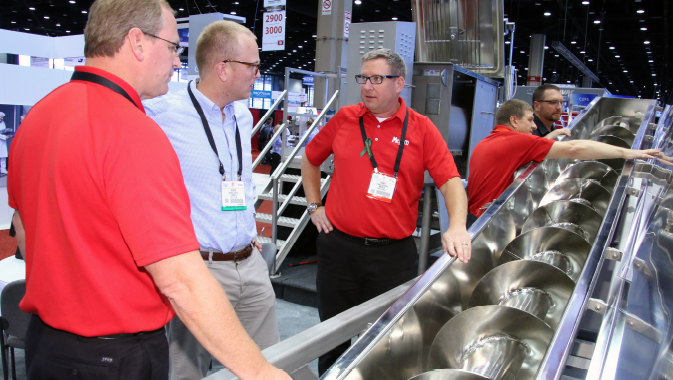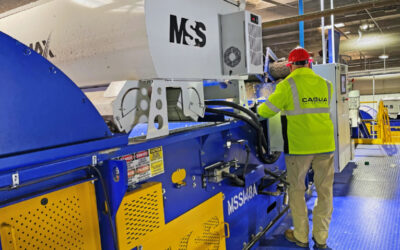The Food Processing Suppliers Association (FPSA), a non-profit global trade association, headquartered in McLean, Virginia, is the largest association in the United States serving the needs of suppliers of equipment and services to the food and beverage processing and packaging industry.
~
Expos have and will remain an international venue for showcasing the latest in innovation, trends, and challenges facing many industries. They are forums where education, cooperation, networking and economic opportunities can be realized by participants. Expos also serve as platforms to address common challenges and garner awareness.
The Food Processing Suppliers Association (FPSA), a non-profit global trade association, headquartered in McLean Virginia, is the largest association in the United States serving the needs of suppliers of equipment and services to the food and beverage processing and packaging industry.
The association, which was known by various names, dates back to the 1880s. It was formed in response to a need for processing and packaging equipment manufacturers to showcase their wares. Initially, these manufacturers produced canning equipment for fruits and vegetables, but this equipment was too large, cumbersome and expensive to transport to those customers wanting to purchase such equipment.
The FPSA trade show enabled manufacturers to assemble every few years to showcase their equipment for the processing industry. The trade show also provided a forum to speak with qualified and experienced people, observe how the machinery operated and arrive at a decision about which equipment solution would best fit unique processing needs.
The Foundation of the FPSA was established in 1983 and is, “a separate entity that provides educational and scholarship efforts to help support the food and beverage industry,” says Andy Drennan, FPSA’s senior vice president of international market development.
The association has approximately four hundred members, of which ninety to ninety-five percent are U.S.-based. Andy explains that FPSA members “produce solutions for every link in the supply chain, be it the arrival of food into the plant through delivery at the retail level. We have members in all of that.”
In 2016, FPSA signed an agreement with one of the world’s largest trade show organizations, Messe Frankfurt, which operates in over 175 countries. The FPSA also has a contract with Messe Dusseldorf, another leading trade fair ground organizer. These partnerships are proving to be instrumental in benefitting the agenda of the FPSA, particularly their owned and organized Process Expo, the nation’s largest food and beverage industry trade show which is to be held in Chicago, Illinois, September 19 to 22, 2017. The first edition of the relaunched Process Expo was held in 2006, and in 2011 became a standalone trade show, moving to a biennial show format.
“Both of those organizations are promoting Process Expo to their markets, not just in Germany, but all over the world,” explains Andy. These organizations sell booth space for the FPSA, at times, and also promote attendance at the show. “So we get a double benefit from those partnerships, and we feel that moving forward, that’s only going to continue more so.”
Andy relates that Messe Dusseldorf’s Interpack 2017, the packaging sector’s leading trade fair, held every three years, had given the FPSA free booth space and participation in trade show meetings. This provides the FPSA with “quite a bit of promotion to their core audience which is very important to us,” particularly since packaging is, “a very important part of Process Expo.”
This year’s Process Expo expects to see approximately six hundred exhibitors. These exhibitors will be showcasing machinery and the latest technologies along with a display of fully functional production lines and a virtual reality showroom. The Expo acts as an educational forum in which such topics as industry trends and safety and regulations will be discussed.
Two conferences a year are held by the FPSA, for both members and non-members that indicate an interest. “Those tend to be focused on business issues – doing business within the food and beverage industry. We get very good attendance from those two,” says Andy.
A show operations conference is held in the summer, “to focus on marketing issues to help support our members’ investment in the trade show (Process Expo),” adds Andy. “In short, we put together a program that helps [members] be more effective at the show … In the non-show year (2018) we hold our sales conference. Most companies join FPSA with the goal of increasing sales opportunities. For each sales conference, we put together a program that tackles a wide range of issues that help them do just that.”
There are also ten free webinars a year for members along with commissioned trend studies for specific industry segments to which members sell. This year, for example, there are trend studies for the meat, poultry and pet food industry. “Those are extensive trend studies all over the world, and they’re free of charge for our members.”
The FPSA is comprised of five councils: bakery, beverage, dairy, prepared foods and meat and the unified poultry and seafood council. Andy explains that the reason they have five different councils is that, “the segments within the food industry are very different. They face different realities. The councils serve to unite our suppliers and the processors in those particular segments to address issues of critical concern within each.”
Each council’s mission statement is essentially the same – to enhance and strengthen member participation in the Process Expo, increase membership and conference numbers and provide a value proposition for member companies.
The association’s food safety committee consists of members and has been crucial in interpreting the FDA’s Food Safety Modernization Act (FSMA) regulations so that, “members can get a better understanding of what the government regulations are,” says Andy. In addition, when the federal government requests comments on proposed regulations, the FPSA reaches out to its Food Safety Committee to collect comments which are formally submitted to the government. “FPSA is not a lobbying organization,” he says. “However, we do have a stake in food safety, and we do represent the supplier in the food industry.”
Education is an important part of FPSA’s reason for being. Its newly formed initiative – the Young Professionals Group (YPG) – is an attempt to engage and entice young professionals into realizing the opportunities within the industry. “We are watching our workforce get older,” explains Andy. “It really is a problem in the food industry.”
He suggests that young people may not be aware of the employment opportunities in the food industry and that the industry has fairly steady employment. “Salaries tend to be higher in the food industry,” considering the worker shortage, and suppliers are seeking, “talented people that can work on equipment.”
The YPG is the FPSA’s first attempt to show interested youth that, “there is a place for them in our industry,” he says. This group is essentially comprised of members who are millennials with the focus on “networking and creating new opportunities for them.”
Another initiative announced in 2015 is FPSA’s FIT (Food Industry Technician) certification program which is, “really our attempt to provide good qualified technical help, not just to the suppliers, but also to the food processors. That’s critical.” Since these skilled workers are very much in demand, the FIT certification program is something the association will continue to encourage and develop.
The FPSA has different scholarship programs such as its new career development scholarship program that awards fifteen $5,000 scholarships and its meat science scholarships that awards $75,000 to students. What the FPSA has learned from the scholarships programs is that “there is a tremendous amount of talent in our universities that are coming out into the marketplace. We want to support that; we want to encourage that. It’s gratifying to see.”
The Give Back Initiative, in partnership with the Greater Chicago Food Depository (GCFD), was established in 2013. The FPSA has been conducting its tradeshow in Chicago for decades, explains Andy, so Chicago, “really is the heart of the food industry. Our customers and their customers expect the show to be in Chicago. So we’re committed to the city of Chicago.”
Part of the Give Back Initiative is the Defeat Hunger campaign in which Process Expo conducts a food drive, with all proceeds donated to the GCFD in an effort to combat hunger in the city.
Another program supported by the FPSA is Bake for Life, a non-profit organization based in Holland. Bake for Life assists young disabled individuals train for careers as bakers through the construction of bakeries in Uganda and Ghana. Bake for Life has been, “creating financial opportunities for the underprivileged in those two countries,” adds Andy. “People are picking up their lives and learning a trade, and we’re very proud of that.”
What was to be a one-time donation from FPSA has now become a yearly ritual. “It makes you feel good about the work that your [organization] is doing.”
Not unlike any other industry, food processing is evolving to meet more rigorous consumer demands. Andy explains that there has been much consolidation in the industry, so much so that large consumer packed goods firms, “are experiencing ever tightening margins. They need to see an ROI on their capital investments and they need more efficiency; it gets tighter and tighter each year.”
Suppliers are finding that they need to provide equipment that creates a more efficient final product, reduces waste, reduces utility expenses and, “ensures a safe product.” Such challenges are creating new standards every year, and suppliers are certainly up to the task. “It’s ongoing, and I don’t see that changing at all,” affirms Andy.
With changes in consumer tastes come new products and opportunities for food processing and beverage manufacturers. Beverage and food manufacturers are finding themselves doing shorter production runs rather than large runs of a single product. The change over from long to short runs is done using the same equipment, so there is a need to clean the equipment thoroughly of allergens and bacteria. Clean in Place (CIP) systems have been utilized for a long time.
“What our members are concerned about – the suppliers – is that the equipment is easily cleanable. It is critical that they clean the equipment between production runs. They know how to do that, and they work with their customers to make sure it gets done right.”
So what are the benefits to becoming a member of the FPSA? Most companies join the association because they, “get a very nice discount on their exhibit space at Process Expo,” says Andy. “Process Expo, I would say, is the number one benefit for joining the association.” Not only do members get a discount but several member committees help them run the trade show. “So the members have a very strong say in what we do for the trade show. You could say that they run the trade show.”
“We will continue to grow Process Expo into other segments of the food and beverage industry,” says Andy of the future of the FPSA. This year’s Expo will have a good showing in pet foods, in both equipment and educational programs. “That’s a logical progression for us since there’s not a lot of difference in producing human food and pet food.”
The FPSA will continue to promote networking among its many obligations as an association and to discuss critical topics with those with experience. All this will be its effort to ensure all members are, “benefitting from this knowledge. That is critical. That cannot be underestimated,” concludes Andy.













